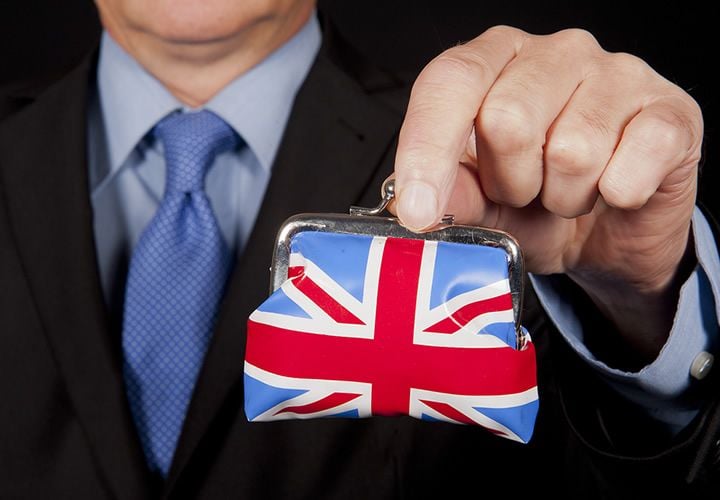GBP/USD Rate Capitulates as Terror and Inflation Unite in GBP-Negative Cocktail

The British pound has come under fire over the past 24 hours following the release of soft inflation data and an increase in the odds of the UK leaving Europe in the June referendum in the wake of the Brussels terror attacks.
- Terror attacks in Brussels see odds for a Brexit slashed
- Latest ICM poll confirms Leave campaign is ahead
- Inflation data softer than forecast; fails to provide support for GBP
- CitiFX: Sell-off has gone far enough
The recovery rally off the recent 7 year low in GBP/USD has stalled out ahead of key resistance at 1.4668, potentially setting the stage for the start of the next break lower.
Since December the uncertainties surrounding the EU referendum in 2016 have manifested themselves in a weaker British pound as markets do not take kindly to uncertainty.
In fact, if there was no vote the pound would be trading above 1.50 according to reliable studies.
Most investment banks still see the GBP to USD exchange rate ending 2016 higher than it currently is, but this assumes the UK votes to stay in the UK. All are unanimous in calling for a lower exchange rate should the UK vote to leave.
Price action over the past 24 hours suggest a bias towards more losses is growing. "A break back below 1.4053 will strengthen this outlook and expose a retest of 1.3836, which guards against the multi-year base at 1.3500 further down. Back above 1.4668 would be required to take the immediate pressure off the downside," says a note from LMAX Exchange regarding potential direction in the pound to dollar rate from here.
A word of caution for those looking to bet on further declines.
CitiFX suggest that there is a risk that the Brexit theme leads to an overreaction.
"But with markets well alert to any factors influencing Brexit risks well in advance of the events in Brussels, the 2 big figure selloff is seen as enough for the time being given that the Brexit referendum is still 3 months away and markets eventually consolidate, thanks to improved liquidity condition and a recovery in equities and oil prices," say Citi in a note to clients.
{module Intext Live Currency Rates: GBP/USD
Odds for Brexit Increase
Social ructions in Europe during 2015 resulted in an increase in support for the Out vote, the same will be true in 2016.
Hence, the events in Brussels are an all-out negative for the UK currency.
To underline just what a big deal these events are for GBP, in the hours following the attacks bookmakers have cut their odds on a Brexit.
Bokmaker Paddy Power narrowed its odds on a Brexit to 7/4, or 36 percent, from 2/1, or 33 percent, on Monday.
Betfair also shortened its odds to 36 percent, while four major bookmakers, including Bet 365 and Sky Bet, narrowed their odds to 6/4, or 40 percent.
To top it all off the latest ICM poll released overnight confirmed a 2 percentage point lead for the Out campaign. Momentum is clearly shifting in a GBP-negative direction.
The British pound desperately needs more clarity on what a post-Brexit economy would look like if it were to stop falling in reaction to news the Out campaign is moving ahead.
Most businesses are pitted against a Brexit which means the body of evidence for staying will always be greater.
Inflation Data Adds to Sterling's Pain
The pound has also been subject to the release of inflation data that came in below the 0.4% rise forecast by analysts.
The 0.3% reading is unchanged on the previous month.
Inflation remains, arguably, the most important economic statistic for the pound as it is inflation that will determine when the Bank of England raises interest rates.
The Bank of England surprised markets last week by confirming they expect interest rates to move higher as they see inflation rising over coming months.
If inflation data had beat expectations we would imagine sterling would have risen as the data reinforces the view that inflation, and interest rates are headed in a sterling-supportive direction.
The GBP remains a slave to interest rate expectations as the hope of higher rates tends to stoke global investor demand for UK assets.
A side effect of this increased investor demand is a higher sterling.
Moody's Discounts CBI's Hysterical Brexit Warnings
The debate surrounding the EU referendum remains as lively as ever.
The week started off with the now notorious EU cheerleaders at the CBI warning voters off from voting for an EU exit by suggesting such an event would result in something resembling an economic apocolypse.
(Remember what happened to the last leader of the CBI, John Longworth? He was forced out of the body for publicly stating his personal support for Britain’s exit from the EU.)
According to the CBI, 1 million jobs will go and the economy would suffer a £100bn loss.
Ratings agency Moody's have given their assessment less than 24 hours later with their verdict confirming the CBI's views to be bordering on hysteria.
The credit rating agency reckons the economic impact of Brexit would be small and unlikely to lead to significant job losses
Moody’s commented that the UK could also be allowed to keep many of its trade terms with the EU so as to avoid disruption on both sides.
This is the kind of insight that markets will need more of if they are to break the habit of selling sterling in reaction to news the Out campaign could win the day.
